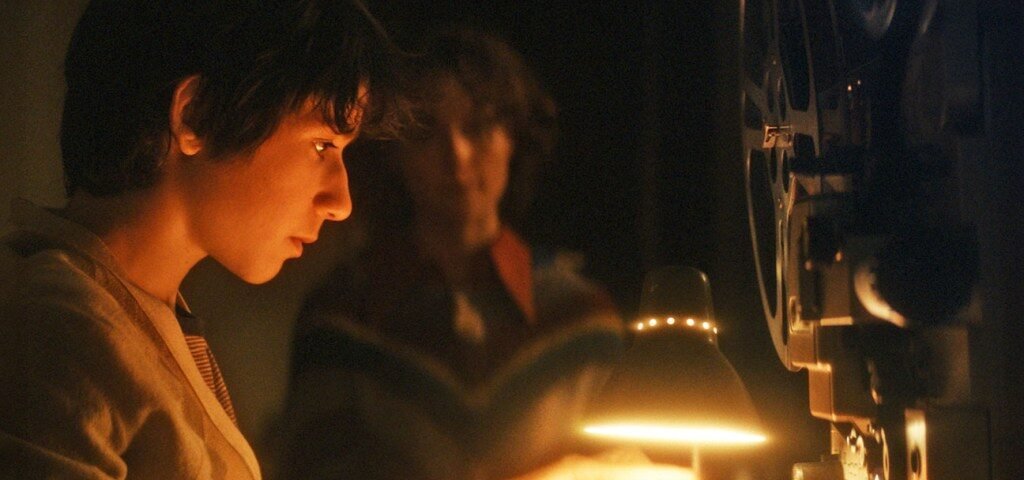


‘The Village Next to Paradise’ Review: Somali Family Drama Doubles as a Potent Portrait of Life in the Shadow of War
May 30, 2024


‘To a Land Unknown’ Review: A Gritty Drama About Young Palestinians Caught in an Eternal State of Exile
May 31, 2024Through narrative vignettes and nonfiction musings, and with a cast that includes Mathieu Amalric and ‘Anatomy of a Fall’ star Milo Machado-Graner, the French director explores the experience of watching movies.
Filmlovers!
A shimmering fusion of memory and movie love.
Movies are hot, according to Marshall McLuhan, who wasn’t paying them a compliment but placing them within his theory of hot and cool media. He was referring to the sensory richness that makes movies such a captivating and complete experience that they require little active participation from the audience. Just sit in the dark and let the magic wash over you. Arnaud Desplechin doesn’t disagree about the magic, but he puts a different slant on things in the docufiction Filmlovers! (Spectateurs!), whose focus is the moviegoer as an essential part of the equation.
In the press notes for Filmlovers!, the director waxes idealistic about movies: “We talk about them, we discuss them, all as equals. The cinema is the most democratic place there is.” Apparently he’s never been on the lower rung of Cannes’ press-pass hierarchy. Cruel industry realities aside, though, Desplechin’s embrace of the audience, not as a distant other but as a group he’s a part of, comes through in every facet of his new film’s vibrant prism.
Filmlovers! moves back and forth between vignettes tinged with autobiography and film theory convos, its discursive flow guided by the voiceover narration of Desplechin and his frequent collaborator Mathieu Amalric. It’s divided into chapters, and the cuts are clean, brisk jolts in time and place (the editors are Laurence Briaud and Naïri Sarkis). Noé Bach’s cinematography has a dream-edged beauty, matched by Grégoire Hetzel’s elegant score.
There are familiar touchstones to set things rolling: Muybridge’s groundbreaking photographic studies of motion, Edison’s kinetoscope, the Lumières’ revolutionary fabulosity, Godard’s 24 truths per second. (And a bit of cultural pride: Acknowledging that “America invented the first films,” Desplechin quickly adds that “France found cinema.”) There are discussions revolving around matters of spectacle and surveillance, the movie-attuned musings of philosopher Stanley Cavell, the influential observations of critic André Bazin. But Filmlovers! is no theory-laden yakfest; it’s a personal walk through the charged territory of a life’s movie-loving story.
Desplechin is 63, a natural age for backward glances and taking stock, although such delves into formative memory always have been central to his filmography. Paul Dédalus, the alter ego whose surname evokes Greek mythology and James Joyce, and who has appeared in three previous Desplechin films — My Sex Life, My Golden Days and A Christmas Tale — provides a throughline here. The character (previously played twice by Amalric) is embodied at age 6 (Louis Birman), 14 (Milo Machado-Graner), 22 (Sam Chemoul) and 30 (Salif Cissé).
The teenage Paul, played with self-possession and a sense of wonder by Machado-Graner, who made a searing impression in last year’s Anatomy of a Fall, deepens his infatuation with movies by leading a cinema club in school. Serving as curator and projectionist, he’s a conjurer summoning whole new worlds from the machinery. When he inflates his age by a few years to get into a theater showing Cries and Whispers, the ticket seller warns him, “You’re going to be bored!” — as pithy a depiction as I’ve seen of the difference between those who feel at home in the art house and those who don’t.
For the young adult (Chemoul), an ardent admirer of Francis Ford Coppola, the art house is the place to be, Ring Lardner hardcover in tow and romantic triangle to explore, however noncommittally, with two female friends (Marilou Poujardieu, Salomé Rose Stein). For the grown-up Paul, played with aspiring-director passion by Cissé, a chance encounter with a filmmaker (narrator Amalric, stepping onscreen) is a sign of destiny.
Desplechin’s nods to the past also include tributes to departed figures he admired: the actor Misty Upham (Frozen River), whom he compares, provocatively, to Marilyn Monroe, and the filmmaker Claude Lanzmann (Shoah), whom he calls a creator on the level of Picasso in terms of his reinvention of the medium. Thirty-seven years after seeing Lanzmann’s indispensable nine-and-a-half-hour documentary about the Holocaust, Desplechin pays a visit to Tel Aviv to thank literary critic Shoshana Felman for her article about the film. Together they discuss the experience of viewing Shoah, a searching conversation that’s devoid of dogma (and which took place before Israel’s policy in Gaza put it at the center of global political tensions).





